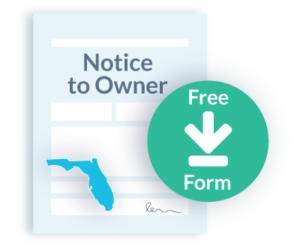Private projects
General contractors in Florida must provide list of all subcontractors and suppliers within 10 days of request from the property owner.
General contractors in Florida must provide list of all subcontractors and suppliers within 10 days of request from the property owner.
Prime contractors are not required to provide a preliminary notice on public projects in Florida.
On a private construction project in Florida, any party not hired by the property owner must send a Notice to Owner by the earlier date of:
Sub-Subcontractors must serve notice to the property owner by the earlier date of:
On public construction projects in Florida, any party not hired by the general contractor must send a Notice to Contractor to the GC to protect their right to make a bond claim.
Preliminary notice is required by the earlier date of:
Any party who does not have a direct contractual relationship with the property owner is required to serve a Notice to Owner (or NTO), with the exception of laborers. Preliminary notices are very closely integrated into the fabric of the Florida’s mechanics lien laws. Design professionals (like landscape architects, engineers, and interior designers) are not required to provide a preliminary notice to owner, because these parties only have lien rights in Florida if they have a direct contract with the owner.
While parties with a direct contract with the property owner (prime contractors / GCs) do not have to send an NTO, they do have some potential requirements related to providing notice. Property owners may request a list of subcontractors and suppliers that are working on the project. If that happens, the direct contractor has 10 days to supply a list of all subcontractors and suppliers that they have hired.
If the contractor posted a payment bond, and the property owner recorded the bond with his Notice of Commencement, all lien claimants who did not contract directly with the owner must serve the contractor a Notice to Contractor.
Generally, parties without a direct contract with the property owner must send preliminary Notice to Owner within 45 days of first furnishing labor or materials to the project.
• Specialty material fabricators have 45 days from when they began work on making the materials.
However, for participants that perform work at (or toward) the end of the project, Florida law specifically mandates that they provide notice before the owner’s final payment to the project’s prime contractor. This is only the deadline marking the latest the notice can be provided.
• Use this deadline calculator to quickly calculate your NTO and lien filing deadlines.
Florida statute makes it clear that a party can provide an NTO as early as they like – you cannot send a Notice to Owner too early. Providing a notice late, however, causes the sender to lose their lien rights entirely.
While it’s obvious that a notice called a “Notice to Owner” should be sent to the property owner, other parties must also receive the document. Florida requires that the notice be sent to the other parties “up the payment chain” from the party giving the notice. This means that first-tier subs should send the notice to the GC as well as the owner, and sub-subs should send the notice to the owner, the GC, and the sub that hired them. In some cases, you may need to send more than one NTO.
Florida’s mechanics lien rules are unique in that property owners or agents of the owner are required to file a Notice of Commencement at the start of the project. When this is done, they are allowed to appoint an “Owner Designee,” who will receive Notice to Owner filings on behalf of the owner. Generally speaking, when an Owner Designee is designated in a Notice of Commencement, the furnishing party can provide notice to that party instead of the actual owner. There are many complexities construction parties need to navigate when sending notice to the Owner Designee.
Interestingly, failing to serve an NTO on the owner designee does not necessarily kill your lien rights. Fla. Stat. § 713.06(2)(b) notes that: “the failure by the lienor to serve such copy, [on the owner designee] however, does not invalidate an otherwise valid lien.”
Another complexity may exist if the ownership of a property transfers or changes during the course of a construction project. This was addressed in a recent Florida case: What can happen to the notice requirements if the property is transferred to another owner.
Florida requires a lot of information and text to be included in a Notice to Owner form. However, certain information (like the identity of a subcontractor) is required only if the noticing party has knowledge of it. All parties providing notice are specifically allowed to rely on public information contained in the Notice of Commencement (or, if one was not filed, in the building permit) when sending their notice.
Generally speaking, a Florida Notice to Owner should contain the following information:
In addition to this information, there is also several paragraphs of warning text set out in Fla. Stat. §713.06(c) to make sure the property owner is aware of liens and ways to protect against them.
• Download a free Notice to Owner (NTO) form that meets the requirements of Florida’s mechanics lien statutes.
The Notice to Owner can be served by actual delivery to the person being served; by registered, Global Express Guaranteed, or certified mail, with postage prepaid; or by posting on the job site if service can’t be accomplished by the previous two methods.
• Learn more about mailing requirements for notices, and when they are considered served.
The Notice to Owner is considered served at the time of mailing only if the notice is sent within 40 days of first furnishing labor or materials. Otherwise, the notice is considered served on the date of receipt.
• See the answer to this related question: Do I lose my lien rights if the NTO I send certified gets lost in transit?
Failing to serve an NTO within the deadline causes a claimant to lose the right to file a mechanics lien in Florida.
Sending an updated Notice to Owner carries significant risk. If the original 45-day deadline to send notice has passed, then sending an amended NTO could cause you to lose your lien rights. However, if you’re still within the time frame to send the NTO, there is likely little risk to sending an amended preliminary notice.
The good news is that Florida rewards “substantial compliance.” According to Florida’s mechanics lien statute § 713.06(2)(f), if a claimant “has substantially complied with the provisions […] errors or omissions do not prevent the enforcement of a claim against a person who has not been adversely affected by such omission or error.”
This essentially means that if an error in an NTO does not adversely affect the parties who were supposed to receive the Notice to Owner, amended notice is not necessary.
• See the answer to this related question: Do I need to update the NTO if the property owners record a new Notice of Commencement?
All parties who do not have a direct contract with the general contractor (excluding laborers) to provide preliminary notice to preserve the right to make a bond claim in Florida.
If preliminary notice is required, it must be sent either before claimant’s first furnishing of labor and/or materials to the project, or within 45 days from the first date of claimant’s furnishing of labor and/or materials to the project. If the notice is sent by registered or certified mail within 40 days of claimant’s first furnishing labor and/or materials, the notice is considered effective as of the date of mailing as long as sending information is retained.
To preserve the right to make a claim against the bond on a public project in Florida, preliminary notice, when required, must be delivered to the general contractor of the project. However, it’s a good idea to send a copy to the surety company as well.
The Notice to Contractor is only required to include the claimant’s information and a statement that the claimant “intends to look to the bond for protection.”
However, there are other useful pieces of information that we recommend including:
• Download a free Notice to Contractor form that meets the Florida statutory requirements.
Preliminary notice on public projects may be sent by the same methods allowed for sending preliminary notice on a private project. This means that sending the notice via registered or certified mail is permissible, as well as personal service, or other method of actual delivery with evidence of delivery.
Similar to the private project Notice to Owner, a Notice to Contractor is considered served at the time of mailing only if the notice is sent within 40 days of first furnishing labor or materials. Otherwise, the notice is considered served on the date of receipt.
When required, preliminary notice is mandatory and failure to send the notice timely may be fatal to the ability to make a claim against the payment bond.
The terms 1099 and employee are mutually exclusive - meaning that they cannot exist together. A 1099 denotes being paid as a contractor. An employee is just that - an employee who receives wages and a W-2. IRS regularly penalizes companies who try to avoid paying 941 taxes by listing its employees as 1099 contractors. In any event, what is your job on the project and who (general contractor, owner, etc.) is supposed to pay you? When I get your response I will be able to advise you of your next step.
Florida contractors and suppliers must generally send a preliminary notice within the first 45 days on a construction project. In Florida, preliminary notice is called a Notice to Owner, or NTO. A preliminary notice is a document used on construction projects in many states to share information about your role on the job, preserve your lien rights, and get paid faster.
Florida’s statutes create very specific and strict rules regarding preliminary notices. On Florida private projects, all parties who did not contract directly with the property owner must serve a Notice to Owner (NTO) on the property owner(s) before the deadline. However, some parties are exempt from the NTO requirement, meaning they are not required to send one:
Most parties on a private construction project in Florida will lose the ability to file a valid and enforceable mechanics lien in Florida if they don’t deliver a Notice to Owner within the appropriate time after beginning work or furnishing materials to a project.
Many parties on a public project (e.g. a state or municipal construction job) also need to send a notice if they want to protect their right to make a bond claim in Florida. However, this is only a requirement of parties who do not have a contract with the property owner OR the general contractor.
Retaining the right to a filing a Florida mechanics lien or bond claim is just one advantage to providing preliminary notice. Because sending preliminary notice provides so many benefits, contractors and suppliers ought to send these notices on every job – whether or not it is required.
Sending a preliminary notice is a critical step that secures payment for contractors and suppliers in Florida — and helps them get paid faster. But the benefits aren’t just enjoyed by sub-tier parties on a project. Sending a Notice to Owner helps everyone on a construction project in Florida — property owners, contractors, developers, lenders, suppliers, and others — all communicate and work together smoothly.
Finding all of the information required on a preliminary notice to owner can be tricky. Fortunately, Florida makes this part pretty simple. On all projects over $2,500, the property owner or lender must file a Florida Notice of Commencement.
This document marks the beginning of the project, and contains all of the important information required to complete a Notice to Owner form. This includes the names and addresses of the property owner, lender, prime contractor, etc. You can get a copy of the Notice of Commencement at the county assessor’s office, or find it posted in a conspicuous place on the jobsite.

Read the step-by-step guide to preparing and serving a Notice to Owner in Florida. This article covers everything you need to know about the form, the information required, and the rules for delivering notice to the owner.

Florida’s mechanics lien laws are specific about the language and information that you must include on notice. Download a free Notice to Owner form here. Our forms are prepared by construction attorneys to meet the requirements in Florida’s statute – making it easy to get this part right.
Making a mistake on the preliminary notice form could cause you to lose your right to file a Florida mechanics lien if you don’t get paid later on. It’s critical to verify all of the the information to ensure that it’s completely accurate.

Florida law is strict about serving a preliminary notice. It must be sent within 45 days of first starting work on the project. Of course, it must be served on the property owner and, if one exists, the owner designee. In addition, it must also be delivered to each party between you and the owner.
In Florida, notice must be sent by certified mail or personal delivery, with evidence of delivery obtained. Learn more about delivery options.
Select Preliminary Notice document.
Provide basic job information.
Levelset sends the document for you. Postage included!
We have a wide range of topics covered in our webinars and short video series. Watch more videos.